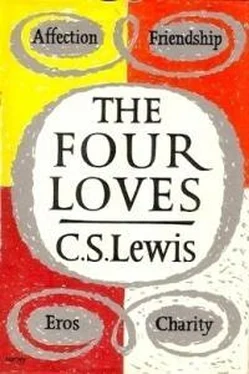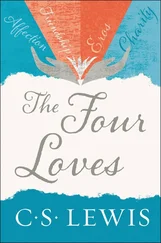And now our principle of starting at the lowest—without which "the highest does not stand"—begins to pay a dividend. It has revealed to me a deficiency in our previous classification of the loves into those of Need and those of Gift. There is a third element in love, no less important than these, which is foreshadowed by our appreciative pleasures. This judgment that the object is very good, this attention (almost homage) offered to it as a kind of debt, this wish that it should be and should continue being what it is even if we were never to enjoy it, can go out not only to things but to persons. When it is offered to a woman we call it admiration; when to a man, hero–worship; when to God, worship simply.
Need–love cries to God from our poverty; Gift–love longs to serve, or even to suffer for, God; Appreciative love says: "We give thanks to thee for thy great glory." Need–love says of a woman "I cannot live without her"; Gift–love longs to give her happiness, comfort, protection—if possible, wealth; Appreciative love gazes and holds its breath and is silent, rejoices that such a wonder should exist even if not for him, will not be wholly dejected by losing her, would rather have it so than never to have seen her at all.
We murder to dissect. In actual life, thank God, the three elements of love mix and succeed on another, moment by moment. Perhaps none of them except Need–love ever exists alone, in "chemical" purity, for more than a few seconds. And perhaps that is because nothing about us except our neediness is, in this life, permanent.
Two forms of love for what is not personal demand special treatment.
For some people, perhaps especially for Englishmen and Russians, what we call "the love of nature" is a permanent and serious sentiment. I mean here that love of nature which cannot be adequately classified simply as an instance of our love for beauty. Of course many natural objects—trees, flowers and animals—are beautiful. But the nature–lovers whom I have in mind are not very much concerned with individual beautiful objects of that sort. The man who is distracts them. An enthusiastic botanist is for them a dreadful companion on a ramble. He is always stopping to draw their attention to particulars. Nor are they looking for "views" or landscapes. Wordsworth, their spokesman, strongly deprecates this. It leads to "a comparison of scene with scene", makes you "pamper" yourself with "meagre novelties of colour and proportion". While you are busying yourself with this critical and discriminating activity you lose what really matters—the "moods of time and season", the "spirit" of the place. And of course Wordsworth is right. That is why, if you love nature in his fashion, a landscape painter is (out of doors) an even worse companion than a botanist.
It is the "moods" or the "spirit" that matter. Nature–lovers want to receive as fully as possible whatever nature, at each particular time and place, is, so to speak, saying. The obvious richness, grace, and harmony of some scenes are no more precious to them than the grimness, bleakness, terror, monotony, or "visionary dreariness" of others. The featureless itself gets from them a willing response. It is one more word uttered by nature. They lay themselves bare to the sheer quality of every countryside every hour of the day. They want to absorb it into themselves, to be coloured through and through by it.
This experience, like so many others, after being lauded to the skies in the Nineteenth Century, has been debunked by the moderns. And one must certainly concede to the debunkers that Wordsworth, not when he was communicating it as a poet, but when he was merely talking about it as a philosopher (or philosophaster), said some very silly things. It is silly, unless you have found any evidence, to believe that flowers enjoy the air they breathe, and sillier not to add that, if this were true, flowers would undoubtedly have pains as well as pleasures. Nor have many people been taught moral philosophy by an "impulse from a vernal wood".
If they were, it would not necessarily be the sort of moral philosophy Wordsworth would have approved. It might be that of ruthless competition. For some moderns I think it is. They love nature in so far as, for them, she calls to "the dark gods in the blood"; not although, but because, sex and hunger and sheer power there operate without pity or shame.
If you take nature as a teacher she will teach you exactly the lessons you had already decided to learn; this is only another way of saying that nature does not teach. The tendency to take her as a teacher is obviously very easily grafted on to the experience we call "love of nature". But it is only a graft. While we are actually subjected to them, the "moods" and "spirits" of nature point no morals. Overwhelming gaiety, insupportable grandeur, sombre desolation are flung at you. Make what you can of them, if you must make at all. The only imperative that nature utters is, "Look. Listen. Attend."
The fact that this imperative is so often misinterpreted and sets people making theologies and pantheologies and antitheologies—all of which can be debunked—does not really touch the central experience itself. What nature–lovers—whether they are Wordsworthians or people with "dark gods in their blood"—get from nature is an iconography, a language of images. I do not mean simply visual images; it is the "moods" or "spirits" themselves—the powerful expositions of terror, gloom, jocundity, cruelty, lust, innocence, purity—that are the images. In them each man can clothe his own belief. We must learn our theology or philosophy elsewhere (not surprisingly, we often learn them from theologians and philosophers).
But when I speak of "clothing" our belief in such images I do not mean anything like using nature for similes or metaphors in the manner of the poets. Indeed I might have said "filling" or "incarnating" rather than clothing. Many people—I am one myself—would never, but for what nature does to us, have had any content to put into the words we must use in confessing our faith. Nature never taught me that there exists a God of glory and of infinite majesty. I had to learn that in other ways. But nature gave the word glory a meaning for me. I still do not know where else I could have found one. I do not see how the "fear" of God could have ever meant to me anything but the lowest prudential efforts to be safe, if I had never seen certain ominous ravines and unapproachable crags. And if nature had never awakened certain longings in me, huge areas of what I can now mean by the "love" of God would never, so far as I can see, have existed.
Of course the fact that a Christian can so use nature is not even the beginning of a proof that Christianity is true. Those suffering from Dark Gods can equally use her (I suppose) for their creed. That is precisely the point. Nature does not teach. A true philosophy may sometimes validate an experience of nature; an experience of nature cannot validate a philosophy. Nature will not verify any theological or metaphysical proposition (or not in the manner we are now considering); she will help to show what it means.
And not, on the Christian premises, by accident. The created glory may be expected to give us hints of the uncreated; for the one is derived from the other and in some fashion reflects it.
In some fashion. But not perhaps in so direct and simple a fashion as we at first might suppose. For of course all the facts stressed by nature–lovers of the other school are facts too; there are worms in the belly as well as primroses in the wood. Try to reconcile them, or to show that they don't really need reconciliation, and you are turning from direct experience of nature—our present subject—to metaphysics or theodicy or something of that sort. That may be a sensible thing to do; but I think it should be kept distinct from the love of nature. While we are on that level, while we are still claiming to speak of what nature has directly "said" to us, we must stick to it. We have seen an image of glory. We must not try to find a direct path through it and beyond it to an increasing knowledge of God. The path peters out almost at once. Terrors and mysteries, the whole depth of God's counsels and the whole tangle of the history of the universe, choke it. We can't get through; not that way. We must make a détour —leave the hills and woods and go back to our studies, to church, to our Bibles, to our knees. Otherwise the love of nature is beginning to turn into a nature religion. And then, even if it does not lead us to the Dark Gods, it will lead us to a great deal of nonsense.
Читать дальше











